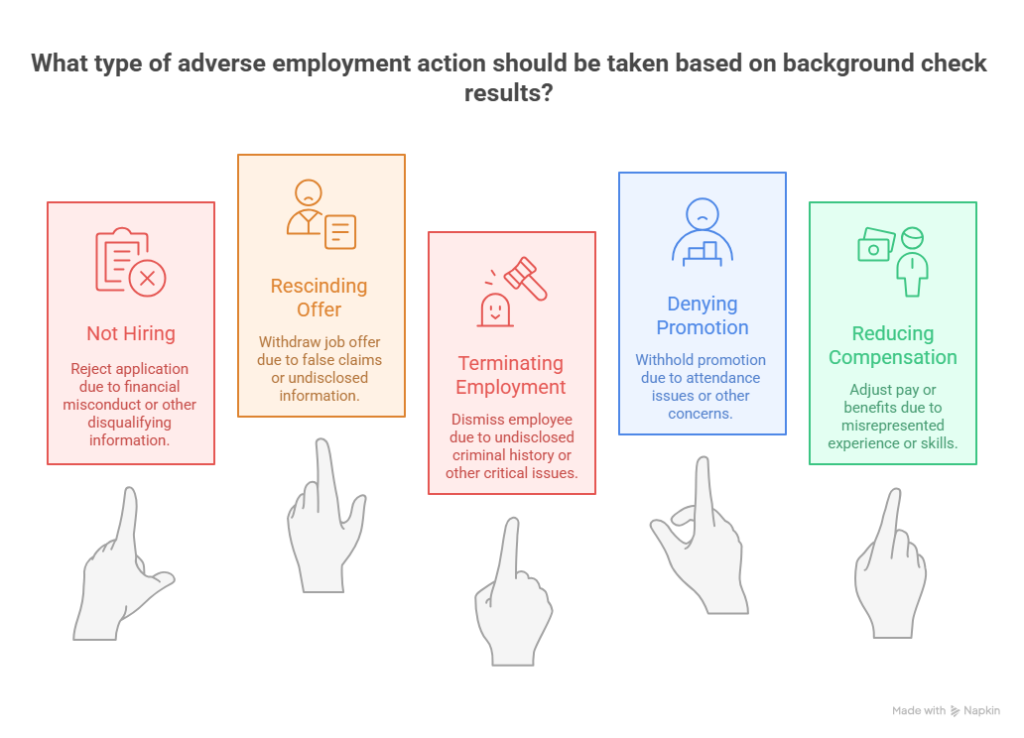Received an adverse action notice? Here's exactly what it means and what to do next. Adverse action refers to a decision that negatively impacts your employment due to background check findings. This matters because these decisions can affect your career path. Employers and job seekers alike need to understand the implications.
For job seekers, it means knowing your rights. For employers, it involves legal responsibilities. This guide will cover what adverse action is, the types you might encounter, potential triggers, and the process itself. You’ll also learn about your rights and steps to take if you face adverse action. Whether you're hiring or looking for a job, this information is crucial.
Key Takeaways
- Understanding adverse action in background checks equips you with knowledge to protect your rights and responsibilities. As an employer, ensure compliance by adhering to the Fair Credit Reporting Act, maintaining transparent communication, and documenting all processes diligently. Engage in regular training for your HR staff to prevent potential legal issues.
- For job seekers, always review your background check report for accuracy. Stay informed about your rights, and know the timelines for disputing errors. If there’s a discrepancy, gather supporting documents and communicate promptly with the background check provider.
- Both parties benefit from proactive communication. Employers should clearly explain adverse actions to candidates, while job seekers should feel confident in questioning and contesting decisions.
- Legal assistance can be crucial. If complexities arise beyond basic compliance, seeking professional advice can help navigate and resolve conflicts effectively.
What is Adverse Action in Background Checks?
Adverse action is a term that carries weight in the hiring process. It refers to the negative steps an employer takes when a background check turns up information that prompts them to reconsider a job offer. It's not just a business term; it's part of the Fair Credit Reporting Act (FCRA), which ensures transparency and fairness in using consumer information.
When it comes to employment, adverse action can mean choosing not to hire someone based on their background check results. This could include anything from not extending a job offer to revoking an existing one. If an applicant's past overshadows their current qualifications, this process kicks in.
The difference between adverse action in employment and other sectors is its focus and implications. While employment-related adverse action deals with hiring decisions, in credit or insurance, it's more about denying applications or adjusting rates. The fundamental principle is consistent: using information to make informed decisions.
Real-world examples of these situations highlight their occurrence and impact. Think about someone who moved for a job offer only to face a revoked placement due to unreported past job performance issues. Or an employee passed over for a promotion due to undisclosed attendance problems in previous roles. Each scenario underscores the importance of transparency and the significant effects of background checks on employment paths.
EXPERT INSIGHT: As a person responsible for giving a negative action notice, I undertake this requirement with complete gravity; this duty goes beyond legal considerations and can have serious implications for a person’s career direction. I’ve seen the impact a lost opportunity can have on candidates on a personal note, especially when that opportunity emanates from a misunderstood error. As human resource specialists, we are called on to be thoughtful, with transparency being the hallmark, along with a firm commitment to fairness. Following due process protection of the organization's interest is, of course, a given, but, more than that, a demonstration of our respect for the person we are dealing with. In many a circumstance, a frank, honest communication can be a lasting memory despite the tough decision. - Charm Paz, CHRP
- Criminal history often sets the wheels in motion for adverse action. If you have a past conviction, employers may see this as a potential risk, especially for roles involving trust or safety. It's a common trigger that could lead to a job offer being withdrawn or not extended at all.
- Credit reports can also play a part. For positions that require managing finances, a spotty credit history might raise red flags. Employers might worry about potential mishandling of their funds if someone struggles with personal finance.
- Employment verification discrepancies are another common trigger. If your job history doesn't match what's uncovered during a background check, employers might see this as a lack of transparency or reliability.
- Education verification can trip you up, too. Claiming a degree or certification you don't have can lead to adverse action. Employers value honesty and accuracy, so any inconsistency here can be damaging.
- Negative feedback from references is yet another trigger. Employers usually check references to confirm your past performance and character. If former supervisors or colleagues paint a different picture than you did, it could lead to consequences.
- Failed drug tests can also initiate adverse action. Many industries, particularly those that prioritize safety, have zero-tolerance policies. Failing such tests can immediately affect your job prospects.
- Finally, financial issues like bankruptcy might raise concerns, particularly for roles with fiscal oversight. Employers may worry about the stress that financial instability might bring, potentially affecting your ability to perform at work.
As someone navigating the job market, understanding adverse action can empower you to make informed decisions and advocate for your rights if you believe an action was unwarranted. It'll also guide you in presenting your background in the most positive and honest light.
Types of Adverse Employment Actions
Adverse employment actions come in several forms, each impacting potential or current employment differently. Understanding these actions can help you prepare and respond effectively if you're affected.
Not Hiring: This happens when a candidate applies for a position, but the results of their background check lead to their application being rejected. For instance, an applicant with a recent history of financial misconduct might not get a job in a bank.
Rescinding a Job Offer: Sometimes, an employer might extend an offer, only to withdraw it once a background check reveals concerning information. If someone claimed a degree they never completed, the employer might retract their offer upon finding out.
Terminating Employment: Discovering critical information after hiring can lead to termination. Say an employee in a security role is found to have a criminal past that wasn’t disclosed—it could result in immediate dismissal.
Denying Promotion or Transfer: Employees aiming for a promotion or transfer might be affected if red flags pop up. For example, a background check might reveal attendance issues at prior jobs, influencing an employer’s decision to withhold a promotion.
Reducing Compensation or Benefits: Lowering benefits or pay based on background findings is rare but possible. Suppose an employee is found to have misrepresented their experience or skills, this could justify a compensation adjustment.

The Adverse Action Process: Step-by-Step
For Employers:
Your role in the adverse action process is pivotal, and following legal requirements is non-negotiable. When a decision hinges on a background check, transparency and compliance are your best allies.
Pre-Adverse Action Notice: Before you finalize a decision, inform the candidate. This notice tells them that a potential job decision could change due to their background check. Include a copy of the report and a summary of their rights under the Fair Credit Reporting Act (FCRA). This ensures they understand what's happening and why.
Waiting Period: After sending the pre-adverse notice, wait at least five business days before making a final decision. This window allows the applicant to review the information and correct any errors. This step isn't just a formality; it respects the candidate's right to dispute inaccuracies.
Final Adverse Action Notice: If you decide against hiring or promoting, send a final notice. Clearly state that the background check influenced your decision. Include details on the background check agency, so candidates can contact them if needed.
Documentation: Keep thorough records. Document what reports were generated, how decisions were made, and all correspondence with the candidate. This isn't just about compliance; it's about safeguarding your hiring process against future disputes.
When you follow these steps, you protect both your organization and the candidates. This transparency not only builds trust but also aligns with federal law, keeping your hiring practices fair and defensible.
For Job Seekers:
Understanding your rights and the process can help you navigate adverse action more effectively.
Expectations: If you're notified of potential adverse action, expect the employer to send a pre-adverse action notice with your background check report and your rights summary. This transparency is your first chance to review the findings.
Timeline: The process involves a waiting period of at least five business days. Use this time to closely examine the background report and compare it with your records.
Taking Action: Have discrepancies been found? Here's what to do:
- Review the Notice Thoroughly: Examine every detail in the background check report. Look for any errors or outdated information.
- Gather Evidence: Collect any documents or statements that refute incorrect findings. This might include previous employment verification letters or corrected credit reports.
- Communicate Effectively: Reach out to the reporting agency and provide them with your supporting documents. Clarity and preciseness are your allies here.
- Stay Informed: You have a right to know the outcome of your dispute. Track progress and ensure the agency addresses your concerns promptly.
Keeping your cool and acting methodically will help you navigate the adverse action process more confidently. By knowing your rights and staying proactive, you can mitigate the potential impact on your career pursuit.
Your Rights Under FCRA
Understanding your rights under the Fair Credit Reporting Act (FCRA) can empower you to handle situations involving adverse actions. Here’s what you need to know:
- Right to Notification: Whenever an employer takes an adverse action against you based on your background check, they must notify you. This includes informing you both before and after the final decision. You'll generally receive a pre-adverse action notice first, giving you the chance to respond.
- Right to Receive a Report: You're entitled to a free copy of the background check report that influenced the decision. This right ensures transparency and gives you a chance to review the findings yourself.
- Right to Dispute: If you find errors in your report, the FCRA grants you the right to dispute these inaccuracies. Accurate records are crucial, and you should act quickly to address any discrepancies affecting your job prospects.
- Right to Know Provider: The employer must tell you which Consumer Reporting Agency (CRA) provided the background check. Having this information allows you to contact the CRA directly for disputes or clarification.
- Time Limits: Timing is crucial. You typically have a limited period, often five business days after receiving the pre-adverse action notice, to dispute inaccuracies. This window is essential for ensuring your concerns are addressed promptly.
Familiarizing yourself with these rights can make a significant difference in navigating the complexities of background checks. Are you prepared to use these rights effectively in case of adverse actions?

What to Do If You Receive an Adverse Action Notice
Immediate Steps:
When you get an adverse action notice, it means your potential employer found something in your background check that might affect your job opportunity. The first step you should take is to review your report. Go through it carefully to ensure everything is accurate. Mistakes can happen, and even small errors might lead to this outcome.
Next, identify any errors. Look for any discrepancies or incorrect information. This might include mistaken identity issues, outdated information, or inaccuracies in past employment history. Once you spot an error, you're in a position to address it.
Finally, gather all documents related to the error. This could be old pay stubs, school records, or documents proving your identity. Having the right materials will support your case as you move forward with disputing any inaccuracies.
Taking immediate, organized action is crucial. It gives you the best chance to resolve issues swiftly and maintain your eligibility for the job. Remember, your proactive approach here is your best tool.
Disputing Errors:
If you spot errors in your background check, the first step is contacting the company that provided the report. This is often a consumer reporting agency. You'll want to reach out promptly. Provide specific details about the errors you’ve identified. Be ready to submit supporting documentation. This might include court records, pay stubs, or any evidence that can clarify discrepancies.
Next, understand the resolution timeline. Agencies typically have 30 days to investigate your dispute. They’ll then report back to you with their findings. During this time, follow up persistently. Verify that all parties involved are addressing your concerns. Keeping records of all correspondence can be crucial.
Finally, once the dispute is resolved, the agency will notify you and the employer of any changes to the report. Always ensure that corrections are made and documented. If the dispute doesn’t resolve in your favor, consider discussing next steps with a legal professional. This can ensure your rights are fully protected.
Next Steps:
Communicating with your employer after receiving an adverse action notice is crucial. Start by being clear and direct. Reach out to your employer to discuss the issues identified in the background check. Be upfront about any discrepancies and share your perspective. For example, if there’s misinformation in your report, explain your side and provide supporting documents.
Consider setting up a meeting or a phone call. This can be more effective than emails alone, allowing for better dialogue. Be respectful and professional throughout, as maintaining a good relationship can be beneficial.
If the situation escalates or remains unresolved, it might be time to seek legal advice. Understanding how employment law applies to your case can help guide your next steps, but ensure you’re engaging with someone experienced in this field.
As for your job search strategy, take proactive measures. Be prepared to explain any background check issues upfront in future interviews. Transparency can build trust with potential employers. Tailor your resume and approach to highlight your strengths, ensuring your past does not overshadow your potential. Keep learning and improving your skills, as personal growth ultimately makes you a more attractive candidate.
For Employers: Best Practices to Avoid Legal Issues
To stay in legal compliance while conducting background checks, focus on these key areas:
- FCRA Compliance: Strictly follow all FCRA requirements. This means providing clear, written disclosure and obtaining written consent before running a background check. Any adverse action must be preceded by the appropriate notices.
- Consistent Policies: Develop and enforce uniform background check policies. Applying these inconsistently can lead to accusations of discrimination or bias. Outline specific criteria for what disqualifies a candidate and ensure these are applied equally to all applicants.
- Documenting Procedures: Maintain thorough documentation of your entire background check process. This includes records of disclosures, consents, adverse action notices, and any communications with the candidate. Well-documented processes can serve as your defense in case of disputes.
- HR Training: Educate your HR staff on the intricacies of FCRA compliance and the importance of uniform application of background checks. Training should cover legal requirements and your internal policies to ensure everyone is on the same page.
- Common Mistakes: Avoid common pitfalls that lead to legal challenges. These include failing to notify candidates of their rights, not providing copies of reports, or making decisions based on outdated or irrelevant information.
- Legal Consultation: Know when to seek legal advice. If you're unsure about the legality of your procedures or facing complex issues, consulting with a legal professional can help you navigate the laws and avoid costly mistakes.
Frequently Asked Questions
How long does the adverse action process take?
The timeline can vary, but there is typically a waiting period of 5 business days between the pre-adverse action notice and the final decision. This gives you a chance to review and dispute findings if necessary.
Can I still get hired after adverse action?
It depends on the circumstances and the employer's policies. If you can correct any errors or provide a reasonable explanation, you might still have a chance.
What's the difference between pre-adverse and final adverse action?
A pre-adverse action notice is a preliminary alert that an adverse decision may occur based on background check findings. It gives you the opportunity to address discrepancies before the final decision is made.
Do employers have to tell you why they didn't hire you?
Employers are required to inform you if the decision was based on information from a background check, and they must provide a copy of the report and a summary of your rights.
Can adverse action be reversed?
Yes, if you successfully dispute the background check findings and resolve any errors, the adverse action can potentially be reconsidered.
What if my background check has errors?
You have the right to dispute inaccuracies with the consumer reporting agency that provided the report. Be prepared to submit documentation to support your claims.
Key Takeaways and Next Steps
Understanding adverse action in background checks equips you with knowledge to protect your rights and responsibilities. As an employer, ensure compliance by adhering to the Fair Credit Reporting Act, maintaining transparent communication, and documenting all processes diligently. Engage in regular training for your HR staff to prevent potential legal issues.
For job seekers, always review your background check report for accuracy. Stay informed about your rights, and know the timelines for disputing errors. If there’s a discrepancy, gather supporting documents and communicate promptly with the background check provider.
Both parties benefit from proactive communication. Employers should clearly explain adverse actions to candidates, while job seekers should feel confident in questioning and contesting decisions.
Finally, legal assistance can be crucial. If complexities arise beyond basic compliance, seeking professional advice can help navigate and resolve conflicts effectively.
Related Terms You Should Know
- Consumer Reporting Agency (CRA): These agencies collect and provide information about individuals' credit or backgrounds. They compile reports used by employers during the hiring process. Understanding their role helps you know where employers get their information.
- Pre-Adverse Action Notice: This is the initial notification sent to a job applicant when an employer is considering not hiring them based on a background check result. It gives you a chance to review and dispute the information before a final decision is made.
- Summary of Rights: Under the FCRA, you are entitled to receive a document that outlines your rights regarding background checks. This summary helps you understand what information you can access and how to dispute inaccuracies.
- FCRA Compliance: This involves adhering to the Fair Credit Reporting Act rules, which govern how background checks are conducted. Employers must follow these regulations to ensure fair and legal processes.
- Background Check Dispute: If you find errors in your background report, you have the right to dispute them. This means contacting the CRA to highlight inaccuracies and request corrections. Knowing this process can protect your job prospects.
- Conditional Job Offer: An offer of employment that depends on the successful completion of the background check. Understanding that it’s not final until all conditions, such as a clear background check, are met is key to navigating the hiring process.
Additional References
- https://iprospectcheck.com/the-adverse-action-process-and-how-it-applies-to-employment-background-checks/
- https://www.seyfarth.com/news-insights/scotus-issues-highly-anticipated-muldrow-decision-rejecting-heightened-harm-requirement-in-adverse-acton-analysis.html
- https://verifiedfirst.com/blog/what-is-adverse-action/
- https://www.justifacts.com/resources/the-correct-way-to-say-no-adverse-action/

GCheck Editorial Team
Meet the GCheck Editorial Team, your trusted source for insightful and up-to-date information in the world of employment background checks. Committed to delivering the latest trends, best practices, and industry insights, our team is dedicated to keeping you informed.
With a passion for ensuring accuracy, compliance, and efficiency in background screening, we are your go-to experts in the field. Stay tuned for our comprehensive articles, guides, and analysis, designed to empower businesses and individuals with the knowledge they need to make informed decisions.
At GCheck, we're here to guide you through the complexities of background checks, every step of the way.






